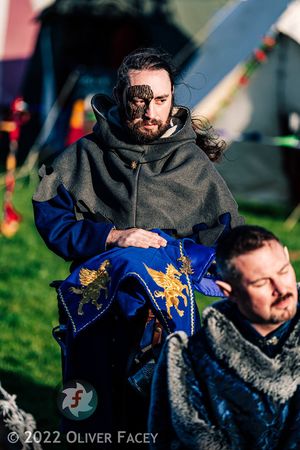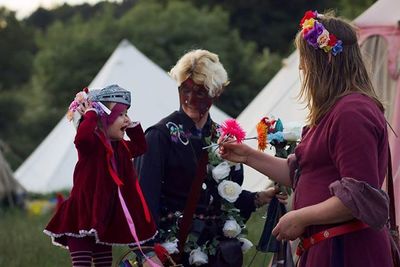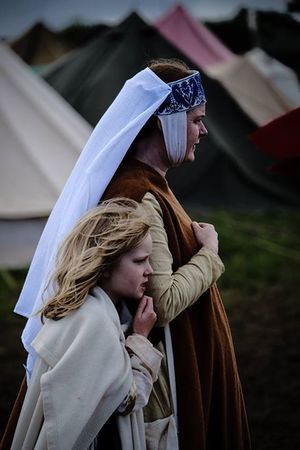Yeofolk of Dawn
No edit summary |
No edit summary |
||
| (70 intermediate revisions by 9 users not shown) | |||
| Line 1: | Line 1: | ||
{{ | {{About|the Dawnish character type|the Marcher population|Yeoman of the Marches}} | ||
{{CaptionedImage|file=Watchful Advocate.jpg|align=left|width=300|title=The role of yeofolk is much more complex - and challenging - than that of the noble in Dawnish society.|caption=Yeofolk support the nobles of Dawn.}} | |||
==Overview== | |||
Anyone in Dawn who has not passed a [[Dawn Culture and Customs#The Test of Mettle|Test of Mettle]] is a yeofolk or yeoman, whether they are a farmer, a merchant, or the daughter of an [[earl]]. In practice the children raised as part of the noble houses - the noble-born - have advantages and luxuries that most yeofolk can only dream of, but in technical terms they are all considered to be yeofolk. | |||
Any yeofolk can demand that a noble house set them a Test of Mettle. Such a request cannot be refused, but the test can be impossibly difficult if the request is not welcome. Some yeofolk spend their entire lives looking for a chance to be ennobled. The more glorious the deeds they perform before they attempt their Test of Mettle, the reasoning goes, the better the chance that the noble house will set them an achievable task. | |||
Although most Dawnish yeofolk accept that they could become a noble if they passed the Test of Mettle, many are put off by the danger inherent in the tests, or lack confidence that they are glorious enough to join a noble house, but some simply prefer their simpler life. Many yeofolk, especially those who work closely with the nobles as part of a house's entourage often enjoy many of the privileges of the noble class. | |||
There are many opportunities to play a Dawnish yeofolk in Empire. Although most Dawnish characters will be noble, there are roles specially designed for yeofolk characters and the social class represents an opportunity to play a lower status character, something which is not part of the designed setting of the other Imperial nations, which assume that all the PCs are of equivalent social class. | |||
{{CaptionedImage|file=FlowerBaby.jpg|align=right|width=400|title=Loyal retainers are often trusted with educating and looking after the children of nobles.|caption=Children - no matter who their parents are - are always yeofolk.}} | |||
== | ==Creating a Yeofolk Character== | ||
If you are planning to create a yeofolk character it is very important to think about the social role that your character will fill, much more important than if you are creating a noble character. Noble characters can move easily from one role to another, taking up Imperial positions, or positions of leadership within the house or the nation as their character finds their feet. This is much harder to do as a yeofolk, so you need to have a much clearer idea in advance of what you want to play. Anyone can be a noble, but if you decide to create a yeofolk character - think about what kind of yeofolk you are. | |||
If you are attending the event with friends who are playing a Dawnish noble house, then you can be part of the entourage of the house even though you are not a noble member of it. Noble houses have hundreds of yeofolk, most of them are soldiers or farmers but the number includes servants and trusted retainers. It is well worth speaking to other members of the group about the role your character might fill and making sure that other players are comfortable with the role you are going to fill - you may well be reliant on their roleplaying to make your character concept work. | |||
If you are attending the event by yourself or with a group of characters playing yeofolk then it is worth looking at the various yeofolk roles that are not part connected with the noble houses. The obvious choice is a knight-errant or a group of knights-errant but there are other roles in Dawnish society that you can fill. If you want to play a ritual team then it is worth considering creating a [[weaver cabal]] instead. | |||
One important choice to think about is why your character isn't noble. The default choice for Dawnish players is assumed to be a noble character, there are thousands of yeofolk in Dawn but most of these are assumed to be NPCs. This is because the characters with ambition, drive, enthusiasm, passion, intelligence and courage become nobles - the characters without these traits remain as yeofolk. You should think about why your character isn't noble - perhaps they are seeking to become noble and have not yet passed their test, perhaps there is some terrible act of shame in their past that prevents it or maybe they prefer the simpler and safer life of a yeofolk. | |||
Please don't create a yeofolk character who disdains the idea of becoming a noble; yeofolk with these attitudes are not welcome in the nation and the few that exist usually leave to live in the Marches. | |||
{{CaptionedImage|file=YeofolkAndChild.jpg|align=left|width=300|title=Yeofolk make up the bulk of the population of Dawn.}} | |||
==Roles for Yeofolk== | |||
This is a brief overview of the roles that Dawnish yeofolk can play, there is further information for each of these ideas for anyone who is interested in playing one. With the exception of the knight-errant, most of these roles are designed for players who want to play a character that is a yeofolk, not a character that is trying to become a noble. | |||
=== | ===Knight-errant=== | ||
A [[knight-errant]] is any character who has publicly declared that they are questing to try to complete a Test of Mettle. Most knights-errant are noble-born but some are born yeofolk. Despite the name, a knight-errant can be a character with any skills, a warrior, a magician a [[Troubadour|troubadour]] or the like. | |||
===Seneschal=== | |||
Trade and money is considered beneath the dignity of a noble, it is inglorious and thus it is better something left to a yeofolk. As a result there are many opportunities for yeofolk who seek to make their fortune, but the [[seneschal]] is a unique role in Dawnish society. These skilled professionals oversee control the estates and wealth of a [[noble house]] and can be some of the most powerful members of the house. | |||
===Retainer=== | |||
Some nobles keep a [[retainer]]; a yeofolk who serves as a personal aide and servant. Retainers are trusted aides who attend to worldly matters allowing their noble to concentrate on striving for glory. Although a retainer is a lower social class than a noble they are often close personal friends and allies. | |||
===Advocate=== | |||
Dawnish senators are chosen from amongst the noble class by tourney. To help them function effectively in the Senate, they may seek the help of an [[advocate]]. These yeofolk study the operation, bureaucracy and history of the Senate allowing them to give pivotal help to the nation's senators. | |||
===Weaver=== | |||
A member of a [[weaver|weaver cabal]] - a ritual magician who is part of a structure that exists outside normal social rules in Dawn. The weaver cabals contain nobles and yeofolk who work together as equals, their power can rival that of the noble houses. | |||
===Yeofolk Soldier=== | |||
The large noble houses of Dawn often maintain their own standing forces of soldiers. These yeofolk are professional warriors who work directly for the house, helping to protect their lands and estates. A normal soldier is not recommend as an option to play at events, they do not normally attend events and are usually NPCs that are represented by one or more noble members of the house taking a [[military unit]]. It is possible that some yeofolk soldier characters might be fun to play, for instance a particularly important member of a large and powerful house might have a personal bodyguard who is a yeofolk soldier. Please be careful before picking this character option however - it exists to fill out the setting, it has not been designed to be fun to play. | |||
===Imperial positions=== | |||
Yeofolk have some social mobility, and may prosper in the [[Imperial Bourse]] and the [[Imperial Synod]], but they will almost certainly never become generals or senators unless they rise to become nobles. Those yeofolk who do well in the arenas of power that are accessible to them will probably find themselves being approached by noble houses and offered a Test of Mettle - after all, if nobles are glorious then it makes sense that they want to make glorious people into nobles. | |||
[[Category:Dawn]] | [[Category:Dawn]] | ||
Latest revision as of 20:48, 4 January 2024
| This article is about the Dawnish character type. For the Marcher population, see Yeoman of the Marches. |
Overview
Anyone in Dawn who has not passed a Test of Mettle is a yeofolk or yeoman, whether they are a farmer, a merchant, or the daughter of an earl. In practice the children raised as part of the noble houses - the noble-born - have advantages and luxuries that most yeofolk can only dream of, but in technical terms they are all considered to be yeofolk.
Any yeofolk can demand that a noble house set them a Test of Mettle. Such a request cannot be refused, but the test can be impossibly difficult if the request is not welcome. Some yeofolk spend their entire lives looking for a chance to be ennobled. The more glorious the deeds they perform before they attempt their Test of Mettle, the reasoning goes, the better the chance that the noble house will set them an achievable task.
Although most Dawnish yeofolk accept that they could become a noble if they passed the Test of Mettle, many are put off by the danger inherent in the tests, or lack confidence that they are glorious enough to join a noble house, but some simply prefer their simpler life. Many yeofolk, especially those who work closely with the nobles as part of a house's entourage often enjoy many of the privileges of the noble class.
There are many opportunities to play a Dawnish yeofolk in Empire. Although most Dawnish characters will be noble, there are roles specially designed for yeofolk characters and the social class represents an opportunity to play a lower status character, something which is not part of the designed setting of the other Imperial nations, which assume that all the PCs are of equivalent social class.
Creating a Yeofolk Character
If you are planning to create a yeofolk character it is very important to think about the social role that your character will fill, much more important than if you are creating a noble character. Noble characters can move easily from one role to another, taking up Imperial positions, or positions of leadership within the house or the nation as their character finds their feet. This is much harder to do as a yeofolk, so you need to have a much clearer idea in advance of what you want to play. Anyone can be a noble, but if you decide to create a yeofolk character - think about what kind of yeofolk you are.
If you are attending the event with friends who are playing a Dawnish noble house, then you can be part of the entourage of the house even though you are not a noble member of it. Noble houses have hundreds of yeofolk, most of them are soldiers or farmers but the number includes servants and trusted retainers. It is well worth speaking to other members of the group about the role your character might fill and making sure that other players are comfortable with the role you are going to fill - you may well be reliant on their roleplaying to make your character concept work.
If you are attending the event by yourself or with a group of characters playing yeofolk then it is worth looking at the various yeofolk roles that are not part connected with the noble houses. The obvious choice is a knight-errant or a group of knights-errant but there are other roles in Dawnish society that you can fill. If you want to play a ritual team then it is worth considering creating a weaver cabal instead.
One important choice to think about is why your character isn't noble. The default choice for Dawnish players is assumed to be a noble character, there are thousands of yeofolk in Dawn but most of these are assumed to be NPCs. This is because the characters with ambition, drive, enthusiasm, passion, intelligence and courage become nobles - the characters without these traits remain as yeofolk. You should think about why your character isn't noble - perhaps they are seeking to become noble and have not yet passed their test, perhaps there is some terrible act of shame in their past that prevents it or maybe they prefer the simpler and safer life of a yeofolk.
Please don't create a yeofolk character who disdains the idea of becoming a noble; yeofolk with these attitudes are not welcome in the nation and the few that exist usually leave to live in the Marches.
Roles for Yeofolk
This is a brief overview of the roles that Dawnish yeofolk can play, there is further information for each of these ideas for anyone who is interested in playing one. With the exception of the knight-errant, most of these roles are designed for players who want to play a character that is a yeofolk, not a character that is trying to become a noble.
Knight-errant
A knight-errant is any character who has publicly declared that they are questing to try to complete a Test of Mettle. Most knights-errant are noble-born but some are born yeofolk. Despite the name, a knight-errant can be a character with any skills, a warrior, a magician a troubadour or the like.
Seneschal
Trade and money is considered beneath the dignity of a noble, it is inglorious and thus it is better something left to a yeofolk. As a result there are many opportunities for yeofolk who seek to make their fortune, but the seneschal is a unique role in Dawnish society. These skilled professionals oversee control the estates and wealth of a noble house and can be some of the most powerful members of the house.
Retainer
Some nobles keep a retainer; a yeofolk who serves as a personal aide and servant. Retainers are trusted aides who attend to worldly matters allowing their noble to concentrate on striving for glory. Although a retainer is a lower social class than a noble they are often close personal friends and allies.
Advocate
Dawnish senators are chosen from amongst the noble class by tourney. To help them function effectively in the Senate, they may seek the help of an advocate. These yeofolk study the operation, bureaucracy and history of the Senate allowing them to give pivotal help to the nation's senators.
Weaver
A member of a weaver cabal - a ritual magician who is part of a structure that exists outside normal social rules in Dawn. The weaver cabals contain nobles and yeofolk who work together as equals, their power can rival that of the noble houses.
Yeofolk Soldier
The large noble houses of Dawn often maintain their own standing forces of soldiers. These yeofolk are professional warriors who work directly for the house, helping to protect their lands and estates. A normal soldier is not recommend as an option to play at events, they do not normally attend events and are usually NPCs that are represented by one or more noble members of the house taking a military unit. It is possible that some yeofolk soldier characters might be fun to play, for instance a particularly important member of a large and powerful house might have a personal bodyguard who is a yeofolk soldier. Please be careful before picking this character option however - it exists to fill out the setting, it has not been designed to be fun to play.
Imperial positions
Yeofolk have some social mobility, and may prosper in the Imperial Bourse and the Imperial Synod, but they will almost certainly never become generals or senators unless they rise to become nobles. Those yeofolk who do well in the arenas of power that are accessible to them will probably find themselves being approached by noble houses and offered a Test of Mettle - after all, if nobles are glorious then it makes sense that they want to make glorious people into nobles.


